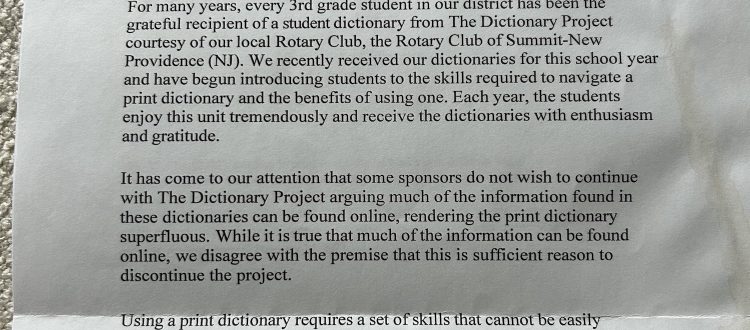Summit Public Schools Defends the Importance of Print Dictionaries and Thanks The Dictionary Project.
Summit Public Schools Defends the Importance of Print Dictionaries and Thanks The Dictionary Project
We are proud to share this strong letter of support from Summit Public Schools in New Jersey. Their message highlights why physical dictionaries remain essential for developing critical thinking, independence, and literacy skills in young learners. Here’s their message:
Letter Content:
February 14, 2024
Mary French, Director The Dictionary Project P.O. Box 1845 Charleston, SC 29402 Dear Mary,
For many years, every 3rd grade student in our district has been the grateful recipient of a student dictionary from The Dictionary Project courtesy of our local Rotary Club, the Rotary Club of Summit-New Providence (NJ). We recently received our dictionaries for this school year and have begun introducing students to the skills required to navigate a print dictionary and the benefits of using one. Each year, the students enjoy this unit tremendously and receive the dictionaries with enthusiasm and gratitude.
It has come to our attention that some sponsors do not wish to continue with The Dictionary Project arguing much of the information found in these dictionaries can be found online, rendering the print dictionary superfluous. While it is true that much of the information can be found online, we disagree with the premise that this is sufficient reason to discontinue the project.
Using a print dictionary requires a set of skills that cannot be easily replicated in an online environment, including the important development and practice of using alphabetical skills as students look up words in a print dictionary. Furthermore, students must think critically while navigating a print dictionary, using guide words and other clues to locate the word. Using a print dictionary can foster a sense of independence whereby students learn to rely on their own problem-solving skills rather than technology as they search for a word. In addition, recent research (Yu-Cin, 2022) suggests reading print uses different cognitive skills than reading online and can strengthen overall cognitive skills. Lastly, an online dictionary which requires a user to do nothing more than simply type in a word to retrieve its meaning lacks the serendipitous nature of browsing a print dictionary and encountering a plethora of previously unknown words in the process.
Sincerely,
Mr. Matthew J. Carlin Principal Lincoln-Hubbard School Summit, New Jersey






